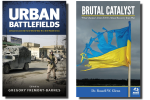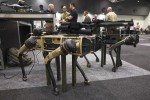Search
Using the filters to the left, click your selection, it will become bold and filter the results, click it again to remove that filter.
The Professional Revolution to Transform Army into an Integrated Enabler 2025 CA Essay Competition Winner Hungarian physician Ignaz Semmelweis died in an asylum in 1865, a pariah in the European medical profession. Two decades earlier at Vienna’s General Hospital, Semmelweis had made a simple observation: the obstetric ward attended by doctors had a maternal mortality rate three times higher than the one attended by midwives. The difference? Doctors performed autopsies in addition to delivering babies, …
2025 CA Essay Competition Runner Up “Our peace strategy must formulate our war strategy, by which I mean that there cannot be two forms of strategy, one for peace and one for war, without wastage – moral, physical and material when war breaks out. The first duty of the grand strategist is, therefore, to appreciate the commercial and financial position of his country; to discover what its resources and liabilities are. Secondly, he must understand the moral characteristics of his countrymen, their history, …
The Structure of War and the Rise of the West Yale University Press, 2024, 473 pp, RRP US$40 (hardcover) Hardcover ISBN 9780300279686 Author: Williamson Murray Reviewed by: Matthew Jones Williamson Murray’s The Dark Path: The Structure of War and the Rise of the Weaast offers more than a sweeping survey of Western military history. It presents a profound intellectual excavation of how war has not only followed but often propelled the ascent of Western civilisation. From the rise of bureaucratic states in …

France at War, 1939–1942 Cambridge University Press, 2023, ISBN 9781107047464, 742 pp, RRP AU$53.95 (hardcover) Author: Douglas Porch Reviewed by: John Nash One of the most fascinating aspects of the Second World War is France’s rapid defeat at the hands of Germany in mid-1940. The success of the ‘Blitzkrieg’ was a shock to many and changed the dynamics of the war. It is easy to see the fall of Paris as the end of France’s war, but this is far from the case. In the five years that followed, French …

The Island Campaigns and the Founding of China’s Navy Author: Toshi Yoshihara Georgetown University Press, 2023, 176 pp, RRP USD$34.95 (softback) Paperback ISBN 9781647122829 Reviewed by: Dan Phelan Much of China’s history, from its ambition and grandeur through to its conflict with foreign powers, has come from and been tied to the maritime domain. In its conquest of and victory over the Kuomintang (KMT), the Chinese Communist Party (CCP) faced the arduous task of building a navy from the ground up with …

Daniel Phelan is a Cyber Security Strategy Specialist at the Department of Defence. Previously he was a graduate within the department, undertaking a rotation with the Australian Army Research Centre. He holds a Bachelor of Information Technology and Arts and a Diploma of Languages, with majors in International Relations, Computer Networks and Security, and Mandarin Studies from Monash University. … Daniel …
Urban Battlefields: Lessons Learned from World War II to the Modern Era Naval Institute Press, 2024, 392 pp, RRP USD$44.95 (hardcover) Hardcover ISBN 9781682477243 Editor: Gregory Fremont-Barnes Brutal Catalyst: What Ukraine’s Cities Tell Us About Recovery From War Key Point Press, 2024, 532 pp, RRP AU$45.05 (hardcover) Hardcover ISBN 9798990915879 Author: Dr Russell W Glenn Reviewed by: Albert Palazzo Urban operations are the type of battle that the military like to avoid but inevitably have …

De Gruyter, 2024, 517 pp, RRP EUR €139.95 Hardcover ISBN 9783110741926 Edited by: James P Rogers Reviewed by: Carl Rhodes The use of drones in warfare has expanded significantly over the past two decades and, as with the applications of any new technology, many questions have been raised about their past, present and future role. These enquiries encompass not only the technological capabilities of drones and their effectiveness on the battlefield but also the ethical implications of remote force …

25 Case Studies on the Global State of Defense AI Springer , 2024, 603 pp, RRP EUR €49.99 Hardcover ISBN 9783031586484 Editors: Heiko Borchert, Torben Schütz and Joseph Verbovszky Reviewed by: Callum Hamilton and Adam J Hepworth Around the world, states and defence organisations are rapidly developing their capacities to seize emergent opportunities in the military use of artificial intelligence (AI). Recent technological advances have enhanced the integration of cloud computing, data infrastructure …

Lessons from the Military Innovation Literature There exists a consensus in modern military circles about the importance of innovation and adaptation. As the Chief of Army states, ‘The side that adapts fastest gains the edge.’ [1] Retired Major General Mick Ryan likewise argues that ‘an important virtue for military organizations to develop in peacetime, and nurture constantly in war, must be adaptability to unexpected events’. [2] Based on his experience as chief of staff of the Ukrainian army, Valery …

